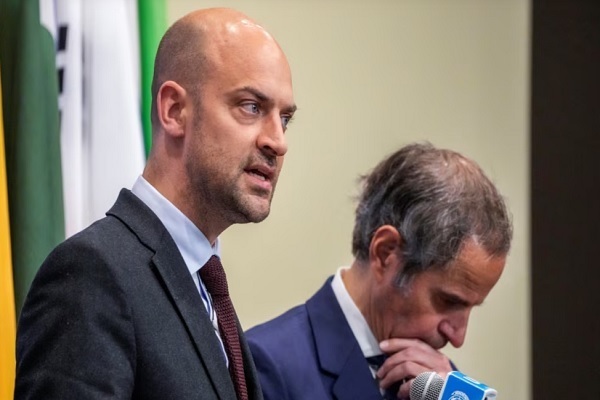
French Foreign Minister Jean-Noël Barrow said in a joint news conference with Rafael Grossi, Director General of the International Atomic Energy Agency that If the nuclear talks on Iran's nuclear program dont reach an agreement and the security interests of European countries are not met, France has the authority to activate the snapback mechanism in the Security Council, which expires in October, and will reimpose sanctions on Iran without hesitation.
“The Islamic Republic is pursuing nuclear weapons and has exceeded all its commitments on uranium enrichment,” he said in a joint news conference with Rafael Grossi, Director General of the International Atomic Energy Agency, on Monday, April 28.
“What is in Europe’s interest is that Iran never obtains a nuclear weapon, and that is why we support and encourage the ongoing talks between the United States and Iran,” Barrow added. "We are coordinating closely with Marco Rubio and Steve Witkoff, because as you know we get closer to the JCPOA expiration date."
The French Foreign Minister said, “The Europeans who are still within the JCPOA must make an important decision by summer, whether to restore sanctions that were lifted ten years ago or not. Of course, this decision depends on the commitments that Iran is willing to accept.”
Before the start of the Iran-US talks in Muscat, Oman, the French Foreign Minister also claimed that time is running out to reach a nuclear agreement with Iran. If an agreement is not reached with Iran, a military confrontation is likely. If an agreement is not reached with Iran, a military conflict seems certain and imminent!
Earlier, The UK, France and Germany sent a letter to the United Nations Security Council stating that they are ready to activate the trigger mechanism if necessary to prevent Iran from obtaining nuclear weapons.
In December, Amir Saeed Iravani, Iran's ambassador to the United Nations, sent a letter to the Security Council calling on the three European countries to "abandon their ineffective and failed policy of pressure and confrontation."
After the third round of Iran-US talks in Muscat, Oman, Majid Takht-Ravanchi had said in a meeting with parliamentarians that if sanctions were to return, one of the options for the Islamic Republic would be to withdraw from the NPT.
The "trigger mechanism" is a mechanism mentioned in the text of Security Council Resolution 2231, which states that if Iran refuses to implement its JCPOA commitments, all Security Council sanctions that have been imposed and applied since 2006 will be automatically reinstated, and Security Council members cannot use their veto power to prevent it.
The European troika's threat to activate the trigger mechanism comes amid Iran-US negotiations, while Iranian Foreign Minister Abbas Araqchi announced on Thursday, April 24, that he was ready to travel to Europe and negotiate with three European countries, and said that after deteration of relations with Europe, the ball is in the other side's court.
He also said that on Friday May 2, we will have a meeting with three European countries in Rome.
The Iranian Foreign Minister emphasized, "I think that the role of the three European countries has diminished due to the wrong policies they have adopted, of course we do not want this. For this reason, we are ready to hold the next round of negotiations with them in Rome."
Araqchi noted, "We will continue our negotiations with the Europeans, but the main negotiations are currently with the United States."
Reuters, citing its Iranian source, said that the European parties have not yet responded to Iran's offer to negotiate with the European troika.
Previously, Araghchi had written on his official account on the X program, "Iran's relations with three European countries have had ups and downs in recent years. Whether we like it or not, these relations are currently in a downward spiral. Why? Each side has its own narrative."
He added," In my opinion, blaming is futile. What is important is that current situation is lose-lose situation for both sides."
Araghchi also wrote, "Last September in New York, when I met with the foreign ministers of the three countries and other European counterparts, I proposed dialogue. I said let's choose cooperation instead of confrontation, not on an issue, but on any other area where we have common concerns and concerns. Unfortunately, they chose the hard way."
The Foreign Minister continued, "I once again propose diplomacy. After my recent consultations in Moscow and Beijing, I am ready to take the first step by traveling to Paris, Berlin and London. We did this before the indirect talks with the US began, but the three European countries did not want to."
He had made it clear, “The ball is now in Europe’s court. They have the opportunity to free themselves from “special interest groups” and forge a different path. Our actions at this critical juncture will likely determine the future horizon.”
Reuters says that Tehran's offer to meet with the UK, France and Germany, known as the E3 or European Troika, shows that Tehran is keeping its options open while also wanting to assess Europe's position on the possibility of reinstating UN sanctions before October, when Security Council Resolution 2231, which endorsed the JCPOA, expires.
According to Reuters, European and Western diplomats also announced that the three European countries are considering whether it would be in their interest to meet with Iran now or whether it would be better to wait for progress in negotiations with the United States.
Regarding E3 threat to activate trigger mechanism, Marc Finaud, former spokesman for the French Foreign Ministry, told Tabnak reporter, "This means giving up any chance for an agreement (between Iran and the United States)."
In his opinion, activating the trigger mechanism would make all Iranian nuclear activities beyond the JCPOA illegal and would lead the E3 and the EU to reimpose sanctions, thereby depriving their companies of any right to trade or invest in Iran; therefore, activating the trigger mechanism could have the opposite result.